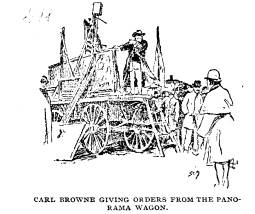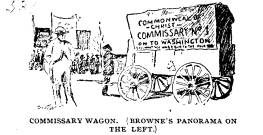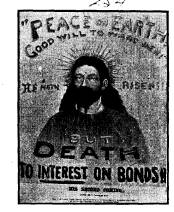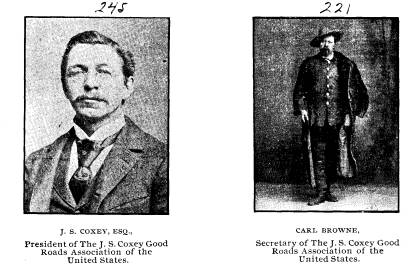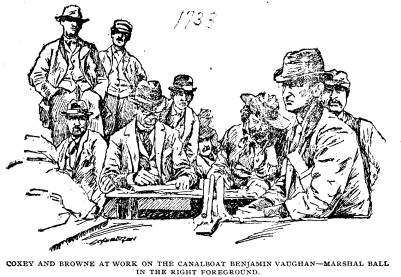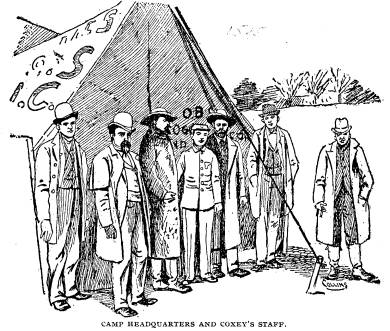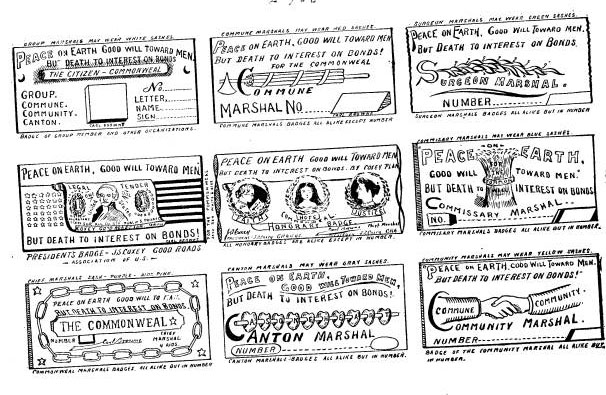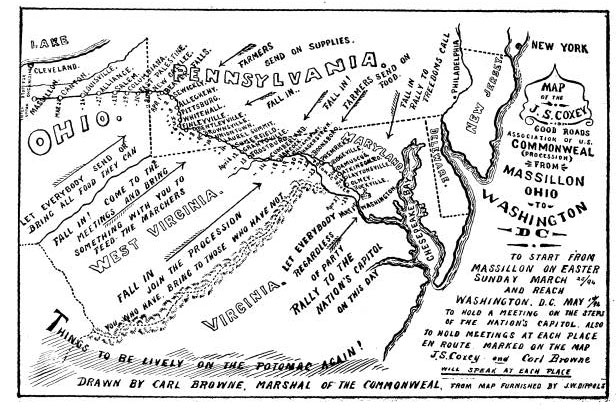Ohio History Journal
- 1
- 2
- 3
- 4
- 5
- 6
- 7
- 8
- 9
- 10
- 11
- 12
- 13
- 14
- 15
- 16
- 17
- 18
- 19
- 20
- 21
- 22
THE COXEY MOVEMENT IN OHIO.
BY OSMAN C. HOOPER.
The Coxey movement of 1894 was a
fantastic expression, at
a critical moment, of the industrial
unrest prevalent for a period
centering about that date. It was an
Ohio product sprung from
a Western seed. Named for its Ohio
patron, Jacob S. Coxey,
its real author and promoter was Carl
Browne, a lieutenant of
Denis Kearney, in the days of sand-lot
politics. The number of
unemployed men was large and discontent
was widespread; so
that, when Coxey and Browne had agreed
upon a course of action
in Ohio, it was easy for them to induce
men in other parts of the
country to follow their example. The
plan of action was a "pe-
tition in boots" to Washington-in
other words, the organization
of "armies" of the unemployed
which were to march to the capital
and demand from Congress, then in
session, legislation which
should directly provide for every man
who wanted it work at a
good wage.
The unique project quickly attracted the
attention of the
newspapers and it was heralded from one
end of the country to
the other. Thus with far less
expenditure of effort on the part
of the promoters than would otherwise
have been the case, the
formation of the "armies" was
begun. In San Francisco, Kelley
operated; in Los Angeles, Frye; in
Chicago, Randall; in Butte,
Hogan; in Providence, Fitzgerald, and in
Massillon, O., Coxey
and Browne. The common demand of all
these "armies," num-
bering about 6,000 men, was for money
and work-money, no
matter how cheap, and work, in some
cases, at least, no matter
how little.
Coxey styled his Massillon movement a
movement in favor
of good roads. The Pacific armies said
little about such reform,
demanding instead state aid for
irrigating the desert. Frye de-
manded government employment for all
unemployed, prohibition
of immigration for ten years and such
legislation as would pre-
vent any alien from owning real estate
in this country. Aside
(155)
156
Ohio Arch. and His. Society
Publications.
from these variations of demand, there
was in some respects a
lack of concerted action, showing itself
at times in sharp criticism
by the other leaders of the tactics
adopted by Coxey. But,
under the circumstances, this was to be
expected. The Coxey
name was given to all and was
unquestioningly accepted by all.
If the western organizations were not
directed by Coxey in the
same way as was the Massillon
organization, all had their origin
in the Coxey-Browne suggestion and were
really looking to the
Ohio man for leadership. The lesser
"generals" were prominent
on the march, but ultimately disappeared
in the shadow of their
common patron, the Ohio rich man whose
sympathy was with the
unemployed and whose purse the energetic
and versatile Browne
had caused to open for the furtherance
of his spectacular plans of
relief.
It was in the first months of 1894 that
Coxeyism made its
debut. The advertisements of its plans
were full of bombast
and very generally provoked a smile. Don
Quixote seemed
again to have appeared. But as the news
of the progress of pre-
parations poured out of Massillon and
the predictions of success
gathered confidence, people began to
regard it seriously-some
with a realization that, although
grotesque, the movement was
not without cause; others with a fear
that the unemployed men
thus gathered would menace the peace, if
not life and property in
the communities they traversed. Both
these classes of citizens
helped the movement along-the first by
encouraging words
and supplies of provisions and clothing
and the second by their
care not to arouse the resentment of the
"army" and their willing-
ness to do everything possible to hasten
the march to the next
stopping place. San Francisco citizens,
alarmed by the recol-
lections of Kearney and his sand-lot
campaign, hurried Kelley
and his 1,500 men east. No community
wanted them, and many
gladly aided in securing the desired and
necessary railway trans-
portation. When there were no
communities so to act, the
Western "armies" boarded
freight trains which they practically
appropriated, being in such numbers as
to make resistance by the
railway employes impossible and
compulsion by the law authori-
ties difficult. In a less degree these
conditions prevailed along
the routes of all the armies. About the
middle of April, 200
|
The Coxey Movement in Ohio. 157 men under the leadership of one Galvin appeared in Ohio and on the 27th were reported at Mt. Sterling where they had seized a train of the Baltimore & Ohio Company. They laughed at the |
|
|
|
company's employes who sought to dislodge them. They re- fused to obey the local authorities who, in despair, called for the aid of the militia. Colonel Coit and the Fourteenth regiment were sent to the scene. There were fears of a conflict, but the demand of the Colonel, the sight of Gatling guns which were |
|
|
|
trained on the intruders and the threat to use them, if the train was not cleared in three minutes, were effective. The militia men boarded the train at one end and the Coxeyites alighted at the other. Subsequently, the authority of the state having been vin- dicated, the men were aided on their journey to and through Columbus toward the national capital. |
158 Ohio Arch. and His. Society Publications.
But it is with the Ohio contingent, the
so-called Common-
weal of Christ, that this article has
especially to deal; and it will
be interesting, having recalled the
harsh industrial conditions out
of which the movement sprung, to note
the character of the pro-
paganda at Massillon, the manner of the
organization, the march
to Washington and the end of the
agitation. Coxeyism, as pre-
sented at Massillon, was a strange
mixture of ideas plucked from
the Bible, from theosophy and the
preachments of political
reformers generally considered unsound.
"Death to usury!"
was one of the slogans of Browne's
campaign. He shouted it
from the rear of his panorama wagon, he
painted it on his gro-
tesque canvases and he printed it on his
bulletins. With that
death, he declared, would come "the
realization of the vision of
St. John of a new Heaven and a new
earth-a realization of what
the Carpenter of Nazareth taught by the
sea of Galilee eighteen
centuries ago, that 'the Kingdom of
Heaven is at hand.'"
Browne professed belief in Christ and in
the truth of the pro-
phecy of His second coming. He declared
that He meant that
the Kingdom of Heaven would come or
could come whenever
the people willed it; and, as it was
explained in one of the Com-
monweal bulletins, that "if the
principles of Christianity were
applied to affairs here on this earth,
it would bring Heaven here
as He wished it, 'on earth as it is done
in Heaven,' and not as
now applied, that believers must die, as
by life insurance, to
win it."
Another phase of Browne's belief was
revealed in an inter-
view with a newspaper correspondent to
which he gave the proof
of authenticity by reproducing it in one
of his own bulletins.
Said he: "Do you not see anything
strange in the coming to-
gether of Brother Coxey and myself? I
believe that a part of the
soul of Christ happened to come into my
being by reincarnation.
I believe also that another part of
Christ's soul is in Brother Coxey
by the same process, and that is what
has brought us together
closer than two brothers. That prevents
all jealousies between us;
that strikes down all rivalries. That
permits of each according
to the other the full measure of credit
due and the establishment
of an equilibrium of justice between us
and mankind that must
prevail over all this land eventually,
as this principle grows. I also
|
The Coxey Movement in Ohio. 159
believe that the remainder of the soul of Christ has been fully reincarnated in the thousands of people throughout the United States to-day, and that accounts for the tremendous response to this call of ours to try and bring about peace and plenty to take the place of panic and poverty. To accomplish it means the second coming of Christ, and I believe in the prophecy that He is to come, not in any one single form, but in the whole people." At another point he explained: "Since all the chemical elements of the human being, as science proves, go back into their various reservoirs of nature, at the death of the person, and thus are |
|
|
|
used over again in the birth of other persons, why may not the soul matter be used over again? This is on the line of reason and not superstition." In accordance with this reincarnation idea, Browne styled Coxey the "cerebrum of Christ" and himself "the cerebellum of Christ." And it was doubtless something more than a fancy that he allowed his hair to grow and trimmed his beard so as to strengthen the resemblance between himself and his favorite pic- ture of the Christ. He painted a banner with a picture of Christ as its central feature and the lettering, "Peace on Earth, Good Will toward men, But Death to Interest on Bonds." It was de- signed to be carried at the head of the marching men alongside the American flag. Coxey, himself, speaking of this banner, resented the suggestion that it was sacriligious. Said he (and |
160 Ohio Arch. and His. Society Publications.
this also appears in one of the
bulletins of the Commonweal):
"He (Christ) was simply a great
reformer. He went about, like
Browne here, doing all the good He
could; and as He preached
against those who lived upon interest
and profit, they, controlling
the masses as they do now, compassed His
death upon the cross."
Believing that their movement was the
fulfillment of the pro-
phecy as to the second coming of Christ,
Coxey and Browne fixed
upon Easter Sunday, the day of the
Resurrection celebration,
for the beginning of their march to
Washington.
"We firmly believe now (reads one
of their proclamations)
in view of the surrounding
circumstances, that the time of the
fulfillment of prophecy is near at hand,
and that all those who
go in this procession to Washington will
be the humble instru-
ments through which the second
Babylon-the Money Power of
Usury-is to fall, and that the second
coming of Christ is now
here; that His coming is not in the
flesh of any one being, but
reincarnated in the souls of all those
who wish to establish a
co-operative government through such
legislation as this pro-
poses, to take the place of the
cut-throat competitive system that
keeps alive the crucifixion-'for the
crucifixion of Jesus is the
spiritual correspondence of the
crucifixion of the people' through
usury. What emotions it must create in
the breasts of all those
who have intelligence and brotherly love
to realize that we are
really living in the era of a great
cataclysm in human affairs;
and how plain it must seem to them, as
it does to us, when they
look about them and think a moment, that
'the world (old cus-
tom) is coming to an end.'"
Turning from the religious sentiments
which Coxey and
Browne professed, it is interesting to
note the character of the
political reforms they sought. These
proposed reforms were
embodied in two bills-one to provide for
the building of good
roads, and the other to provide for the
issue of non-interest-bear-
ing bonds. The text of the first of
these measures was as follows:
"Be it enacted by the Senate and
House of Representatives in
Congress Assembled: That the secretary of the treasury of the
United States is hereby authorized and
instructed to have en-
graved and have printed, immediately
after the passage of this
bill, five hundred millions of dollars
of treasury notes, a legal
The Coxey Movement in Ohio. 161
tender for all debts, public and
private, said notes to be in de-
nominations of one, two, five and ten
dollars, and to be placed
in a fund to be known as 'The General
County Road Fund System
of the United States,' and to be
expended wholly for said purpose.
"Section 2. And be it further
enacted: That it shall be the
duty of the secretary of war to take
charge of the construction of
said General County Road System, said
construction to com-
mence as soon as the secretary of the
treasury shall inform the
secretary of war that said fund is
available, which shall not be
later than ; when it shall be the duty of the
secretary of war to inaugurate the work
and spend the sum of
twenty millions per month, pro rata with
the number of miles
of road in each state and territory in
the United States.
"Section 3. Be it further enacted:
That all labor other
than that of the office of the secretary
of war, whose compen-
sations are already fixed by law, shall
be paid by the day, and that
the rate be not less than one dollar and
fifty cents per day for
common labor, and three dollars and
fifty cents per day for team
and labor, and that eight hours shall
constitute a day's labor under
the provisions of this bill."
The proposed law for the issue of
non-interest-bearing bonds
read as follows:
"Be it enacted by the Senate and
House of Representatives in
Congress Assembled: That whenever any State, Territory, County,
Township, Municipality or Incorporated
Town or Village deems
it necessary to make any public
improvements, they (sic) shall
deposit with the secretary of the
treasury of the United States,
a non-interest-bearing, twenty-five-year
bond, not to exceed one-
half the assessed valuation of the
property in said State, Territory,
County, Township, Municipality,
Incorporated Town or Village,
and said bond to be retired at the rate
of four per cent. per annum.
"Section 2. Whenever the
foregoing section of this act has
been complied with, it shall be
mandatory upon the secretary of
the treasury of the United States to
have engraved and printed
treasury notes in the denomination of
one, two, five, ten and
twenty dollars each, which shall be a
full legal tender for all
debts, public and private, to the face
value of said bond, and de-
162 Ohio Arch. and His.
Society Publications.
liver to said State, Territory,
Township, Municipality, Incorpo-
rated Town or Village, ninety-nine per
cent. of said notes and re-
tain one per cent. for the expense of
engraving and printing
same."
It was to demand of Congress the
enactment of these bills
that the expedition, or "petition
in boots," as it was called, was
planned. Information of the character of
the demand was spread
broadcast, both by circular and by
newspapers. "Now, hurry up,"
read one appeal. "The time is
short; and, although the roads
will be horrible, remember the condition
of the soldiers under
Washington in the snow at Valley Forge,
struggling to win this
fair land from an English tax on tea;
and we, the degenerate sons
of illustrious sires, have allowed
English bond holders to get us
more tightly in their grasp than George
the Third had our fore-
fathers. Rouse up! and demand congress
to issue paper money
based upon our own security. If paper
money could fight battles
and kill men in '61, it can build good
roads and streets and pub-
lic buildings and thus save men from
starving to death in 1895.
Rouse up, ye bondsmen, and protest
against the yoke, at least!"
The plan of organization of the army,
which it was hoped to
set in motion that Easter day in 1894,
was fully set forth in a
circular as follows:
"As order is God's own law, it is
also necessary for all in-
telligent action by His people. So the
proposed procession will
be composed of groups of men (citizens) numbering five (5) in
each, one of whom must be selected to
act as marshal-Group
Marshal-to be numbered in the order of
date of group formation.
Groups may be federated into Companies
or Communes of not
less than thirty (30) men, nor more than
one hundred and five
(105). Communes may be federated into
Regiments or Com-
munities of not less than two hundred
and fifteen (215) men nor
more than ten hundred and fifty-five
(1055). Communities may
be federated into Cantons (Divisions) of two or more. All Com-
munes, Cantons and Communities must
select five (5) Marshals,
to be numbered as first, second, and so on, the same as the Group
Marshals shall be designated, thus:
First Group Marshal, First
Commune Marshal, First Canton Marshal,
First Community
Marshal. Badges of designation will be
furnished free by Brother
The Coxey Movement in Ohio. 163
Coxey, bearing appropriate design made
by myself (Browne),
upon sending certificate of
organization, or when any group or
organization joins the procession. All
Labor Unions, Farmers'
Alliances, or other organizations
desiring to join may do so with-
out reorganizing as above, and will be
given right of line. It
would be well for all companies or
organizations to procure a
wagon, if possible, to carry camp
utensils and supplies for each,
though several wagons will be taken from
Massillon for the
purpose."
The organizers of this project were not
seeking to increase
their own troubles, and so they tempered
their appeal with the
hope that no one in ill health would
join the Commonweal.
They also made it plain that they wanted
no vicious characters.
"We want," said one of the
bulletins, "no thieves or anarchists-
boodlers and bankers-to join us. We want
patriots, not bum-
mers. No firearms, but manhood. * * *
Having faith in
the rectitude of our intentions, and
believing that we are acting
from inspiration from on high, we
believe that the liberty-loving
people comprising this indivisible and
undividable American
Union will respond in such numbers to
the call of duty that no
"Hessian" Pinkerton thugs,
much less State militia or United
States troops, can be hired for gold to
fire upon such a myriad
of human beings, unarmed and
defenseless, assembling under the
aegis of the Constitution, upon the
steps of the national capitol,
to assert their prerogative, shielded as
they would be by right
and justice, and guided by Him in the
interest of good and higher
government; and thus will take place
that battle long foretold, for
it will be as noble Lester Hubbard once
wrote: 'That plain of Ar-
mageddon, dimly seen by ancient seer,
when the brute nature and
immortal soul of man close in final
contest, which shall herald
the dawning of the era of love and
tenderness, when nations shall
know the fatherhood of God and live the
brotherhood of man.
This was the prayer of Him on Calvary's
cross, and at last it shall
come true, for the everlasting God hath
so ordained it.'"
The moving spirit behind all this was
Carl Browne. He
made the plans, wrote the proclamations
and bulletins, devised
the organization, painted the banners,
designed the badges and
conducted the correspondence. He was
secretary of the J. S.
|
164 Ohio Arch. and His. Society Publications.
Coxey Good Roads Association and Marshal of the Commonweal Army. Mr. Coxey occupied the dignified position of President of the Association and supplied the money for the propaganda and the preparations. That he approved all the work and all the doctrine preached in his name by Browne, is not to be doubted, for no protest was heard from him and he played with evident satisfaction the role of presiding genius that was assigned to him by his more active associate. Easter Sunday, the day on which the Commonweal Army was to move, fell on March 25. As the day approached interest |
|
|
|
in the outcome deepened. The weather was damp and chilly and generally forbidding. Certainly the zeal of the recruit was to be put to the test. The evening of Good Friday came, but there were in Massillon few signs of the mighty crusade advertised to begin on the following Sunday. Inquiries at the hotels disclosed the presence in town of a dozen correspondents representing papers in New York, Boston, Philadelphia, Chicago, St. Louis, Cincinnati, Cleveland, Columbus, and other cities, but the clerks, usually omniscient, knew of no gathered or gathering army. Coxey and Browne were at the home of the former, a few miles. |
The Coxey Movement in Ohio. 165
outside of town; a camping ground had
been selected, but a
trip to it disclosed no tent or other
sign of the coming army.
The morning of Saturday dawned gloomy
and disagreeable.
There was a damp and searching
chilliness in the atmosphere
that made a closely buttoned overcoat
comfortable. The search
for the army was renewed at the camping
ground, at the city
prison, where it was thought possible
some of the recruits had
taken refuge, and elsewhere. The search
was not wholly fruit-
less, although nearly so. At the camping ground, one recruit
was found, and, in an unfinished
building, the room in which two
others had passed the night. The number
of correspondents had,
however, perceptibly increased, and as
these news-gatherers
eagerly sought the missing army, they
encountered one another,
and, in their mutual disappointment,
when their identity had been
satisfactorily established, formed
partnerships for the further
pursuit of the much-advertised
Coxeyites.
It was a few minutes after nine o'clock
when the door of the
hotel lobby was opened and a strange
looking man entered. He
stopped a moment to shout some
instructions to the colored
driver of the buggy from which he had
alighted, and then strode
like a conquering hero through the crowd
of correspondents
and others who cleared the way for his
passage. "That's Carl
Browne," the youth at the cigar
stand whispered, and those who
heard looked more intently at the
stranger, who was now at the
desk in conversation with the clerk.
Browne was a tall, well-
built man, with grizzled hair and a garb
very suggestive of the
wild west. His hat was a broad-brimmed
slouch, and his outer
garment a fur coat reaching to his
ankles. Beneath this he wore
a short leathern coat buttoned with
silver half dollars, on which
was stamped the word, "Free."
He wore heavy boots, into the
tops of which his pantaloons were
thrust, and his whole make-
up was eccentric.
Browne had come in with the morning mail
of the Common-
weal, and gathering the correspondents,
who now numbered a
score, about him, he read the letters
aloud. Most of the com-
munications promised contributions of
money and provisions, or
told of the coming of many recruits.
"We shall start tomorrow,"
said Browne, "with 5,000 men, and
before we have gone 100 miles
166 Ohio Arch. and His. Society Publications.
we shall have an army of 10,000."
Questions as to the where-
abouts of Coxey were met with the
statement that he was some-
where in town attending to some final
preparations. He was
quickly found, but he was not easily
identified as the leader of
the movement that bore his name. He
looked too much like an
ordinary business man to be picked out
as the associate of the
picturesque Browne. He was of medium
height and weight.
His rather low, broad brow was
surmounted by dark hair without
a trace of gray. He looked mildly,
though steadily, through gold-
rimmed spectacles. The only hair on his
face was a short, brist-
ling mustache. He was plainly, but
neatly dressed. He did not
court attention and, while in
conversation, he was not effusive.
He was evidently satisfied with what had
thus far been done and
sanguine of the future.
The day brought a number of recruits for
the Commonweal
Army, among whom were the agent of a
struggling reform publi-
cation, a silk-tiled man with a book to
sell, an Indian who wore
moccasins and carried a tomahawk and boasted that he had
fought with Louis Riel in the then
recent Canadian uprising.
These stopped at the hotels. There were
other recruits of less
marked individuality, who went direct to
the camping ground.
A tent was put up and the ground beneath
it was strewn with hay.
A covered commissary wagon, drawn by two
powerful farm
horses, came over the hill and was
halted at the camp. Browne's
panorama, used to illustrate his
lectures, was given a commanding
position at the entrance to the grounds.
Canvas was stretched and
Brown, with brush and paint pot, set
about making banners to be
carried in the procession. As he lettered the canvas or drew
upon it cartoons of monopoly and its
victims, he talked to the
curious throng. How many of the throng
were residents and
how many were of the army, it was for a
time difficult to tell,
but the problem ultimately solved
itself, for all who had homes
were driven to them by the cutting wind.
There remained pos-
sibly 50 men who could be classed as
soldiers in the Commonweal
Army. What sort of men were they? They
were unfortunate
men, many of them without a better
shelter than the Common-
weal tent, or a better meal than the tea
and crackers that were
served there to all who would join the
"army." There were
The Coxey Movement in Ohio. 167
among them, doubtless, honest men who
believed so far as they
could understand it, the doctrine that
Covey and Browne
preached, but there were certainly
others whose presence was
to be explained on the ground of
curiosity and a lack of anything
better to do. If any of them were
vicious law breakers, the fact
did not develop, either at Massillon or
at any point along the
road.
The little "army" was
organized into groups, according to the
plan already explained; pickets were
thrown out, and fires were
built, both to warm the shivering men
and to prepare the first
meal in camp. This meal consisted of hot tea and crackers,
and was served to the groups as they
marched up one at a time.
After this repast came an evening
meeting, largely attended by
the curious of Massillon. Browne was the
speaker and a wagon
was his rostrum. His talk, which was a
reiteration of his procla-
mations and bulletins, embellished with
stories and illustrated
with some of his cartoons, was
entertaining, and he held the
audience long in the cold. One by one, however, the towns-
people, chilled to the bone, went their
way homeward, the effort
at proselyting was ended, and the army
was put to bed in its
straw.
Easter morning was cold and gloomy, like
its predecessor.
But
it brought new recruits to the army, which, at 12:30 p m., set
out on its march to Washington, just 125 strong. First
came
Carl Browne, riding a large iron-gray
horse; then Coxey, riding
In a buggy drawn by two horses, which
were driven by a colored
man; the panorama wagon; the marshal's
aides on horse-back,
and then, two by two, the privates of
the Commonweal Army,
while two canvas-top commissary wagons
brought up the rear.
The banners borne in the procession were
curiosities of letter-
ing, if not of sentiment. They were the
handiwork of Browne.
Here are some of the sentiments
expressed: "Coxey, the Cere-
brum of the Commonweal of Christ,"
"Browne. the Cerebellum
of the Commonweal of Christ,"
"Peace Upon Earth and Good
Will Toward Men, but Death to Interest
on Bonds," "The King--
dom of Heaven is at Hand," Lazarus
Proffers Dives a Cup of
Cold Water. Soon the Great Gulf Shall
Divide Them," "God
is Not the God of the Dead, but of the
Living. The 32d Verse
168 Ohio Arch. and His. Society Publications.
of the 22d Chapter of Matthew Proves
Jesus Christ a Theoso-
phist, for Resurrection Means Simply
Reincarnation, from Death
Here to Living Here Again,"
"The Farmer Leads, for he Feeds,"
"Workingmen Want Work, Not
Charity," "Equal Rights to All,
Special Privileges to None,"
"The Supreme Court of the United
States Has Upheld the Constitutionality
of Our Demand."
Not less than thirty special
correspondents, sent to Massil-
lon from remote cities, to tell the news
of the reform movement,
stood upon the sidewalks and watched
this small company pass.
Then they took carriages to the
interurban railway car and fol-
lowed the "army" to
Canton. Curiosity marked its reception
there. There was no enthusiasm in the
"army" or out of it. The
march was directly through the city to
the suburbs, where the
tents were put up and the
"army" was fed and again put to bed.
The attitude of the people of Canton was
characterized in some
cases by sympathy and in others by fear,
and the "army" profited
in being well treated and hurried
onward. The experience there
was duplicated at nearly every stopping
place. Everywhere there
was curiosity, and at many points recruits were gained. At
Homestead the "army" numbered
600, but it dwindled in the
march across the mountains in the snow
to 140, gaining again
in the more easily traveled districts,
and aggregating 500 when
it marched into Washington May 1. During the march there
were some slight troubles, but there was
no turbulence and no
depredations of consequence. If the commissary supplies ran
short, the men were supplied with
provisions by those who sympa-
thized with them, or those who feared
them. So far as the
preservation of the peace was concerned,
the promises of Coxey
and Browne were satisfactorily
fulfilled.
The passage of the mountains was the
hardest ordeal of all,
and the 140 faithful ones were
complimented by Browne. "Your
names," said he to them in a speech,
"will be emblazoned on the
scroll of fame. As Henry V. said to his
men after the battle of
Agincourt, your names will be as
familiar as household words."
To each man who made the march a card of
merit was issued
like the following:
"The Commonweal of Christ: This
certifies that John
Souther, of Group 3, Commune 1, Chicago
Community of the
|
The Coxey Movement in Ohio. 169
Commonweal of Christ, is entitled to this Souvenir for heroic conduct in crossing the Cumberland mountains in the fact of snow and ice, and despite police persecution and dissension-breeders." Arrived in Washington, the "army" went into camp and pre- pared for the great march down Pennsylvania avenue and the proposed meeting in the capitol grounds. It had been predicted that the parade on Pennsylvania avenue would not be allowed, but police permission was given and the leaders were encouraged to hope that the meeting would also be permitted. It was known that meetings there were prohibited by special act of congress, |
|
|
|
but, as Coxey and Browne held that any such act in abridgment of popular rights was unconstiutional, they were not concerned about the prospective violation of law. They probably believed that the police authorities, as the easiest way out of a dilemma, would ignore the whole procedure. The purpose of the Coxey- ites to hold this meeting in the very shadow of the capitol build- ing was widely advertised and thousands of curious people crowded into the streets and about the buildings at the time ap- pointed. It was a critical hour for the "army;" it was for this demonstration that it had marched hundreds of weary miles, and |
170 Ohio Arch. and His. Society Publications.
the success or failure of the movement
was soon to be written.
The army moved with all the trappings
and in much the same
order as at Massillon. It was an array
of wagons and banners
and humanity such as Washington had
never before seen, and
such as the more thoughtful must have
hoped never to see again.
All went well till the capitol grounds
were reached. The attempt
to enter for the purpose of holding a
meeting brought the police
into activity, but the throng of
sight-seers made the execution
of orders difficult. Apprehending
trouble, Coxey hastened up
the steps of the capitol and was about
to begin his speech when
he was accosted by an officer and told
that he could not speak
there. Yielding to this prohibition,
Coxey asked to be allowed
to read a protest, a copy of which he
drew from his pocket. But
in that, too, he was interrupted, and he
contented himself with
handing the manuscript to a bystander
and asking that it be
turned over to the press. It read as
follows:
"The Constitution of the United
States guarantees to all
citizens the right to peacefully
assemble and petition for the re-
dress of grievances, and furthermore
declares that the right of
free speech shall not be abridged. We
stand here today to test
these guarantees of our Constitution. We
chose this place of
assembly because it is the property of
the people; and if it be true
that the right of the people to
peacefully assemble upon their own
premises and with their petitions has
been abridged by the passage
of laws in direct violation of the
Constitution, we are here to draw
the eyes of the nation to the shameful
fact.
"Here, rather than at any spot upon
the continent, it is
fitting that we should come to mourn
over our dead liberties
and by our protest arouse the imperilled
nation to such action
as shall rescue the Constitution and
resurrect our liberties. Upon
these steps where we stand has been
spread a carpet for the royal
feet of a foreign princess, the cost of
whose lavish entertainment
was taken from the public treasury
without the consent or the
approval of the people. Up these steps
the lobbyists of trusts and
corporations have passed unchallenged on
their way to committee
rooms to which we, the representatives
of the toiling wealth-
producers, have been denied admission.
|
The Coxey Movement in Ohio. 171 "We stand here today in behalf of millions of toilers whose petitions have been buried in committee rooms, whose prayers have been unresponded to, and whose opportunities for honest, remunerative and productive labor have been taken from them by unjust legislation which protects idlers, speculators and gam- blers. We come to remind Congress, here assembled, of the declaration of a United States Senator, that 'for a quarter of a century the rich have been growing richer and the poor poorer, |
|
|
|
and that by the close of the present century the middle class will have disappeared and the struggle for existence become fierce and relentless.' "We stand here to remind Congress of its promise of return- ing prosperity should the Sherman act be repealed. We stand here to declare by our march of over 500 miles, through difficulties and distress-a march unstained by even the slightest act which will bring the blush of shame to any-that we are law-abiding citizens, and as such our actions speak louder than words. We |
172
Ohio Arch. and His. Society Publications.
are here to petition for legislation
which will furnish employment
for every man able and willing to
work-for legislation which
will bring universal prosperity and
emancipate our beloved
country from financial bondage to the
descendants of King
George.
"We have come to the only source
which is competent to aid
the people in their day of dire
distress. We are here to tell our
representatives, who hold their seats by
the grace of our ballots,
that the struggle for existence has
become too fierce and relent-
less. We come and throw up our
defenseless hands and say,
'Help, or we and our loved ones must
perish.' We are engaged
in a bitter and cruel war with the
enemies of mankind; a war with
hunger, wretchedness and despair, and we
ask Congress to heed
our petitions and issue for the nation's
good a sufficient volume
of the same kind of money which carried
this country through one
awful war and saved the life of the
nation. In the name of jus-
tice, through whose impartial
administration only the present civ-
ilization can be maintained and
perpetuated, by the powers of the
Constitution of our country, upon which
the liberties of the peo-
ple must depend, and in the name of the
Commonweal of Christ,
whose representatives we are, we enter
the most solemn and earn-
est protest against this unnecessary and
cruel act of usurpation
and tyranny, and this enforced
subjugation to the rights and
privileges of American citizenship.
"We have assembled here, in
violation of no just law, to
enjoy the privilege of every American
citizen. We are under
the shadow of the capitol of this great
nation, and, in the pres-
ence of our national legislators, are
refused that dearly-bought
privilege, and by the force of arbitrary
powers, prevented from
carrying out the desire of our hearts,
which is plainly granted
under the great magna charta of our
national liberties.
"We have come here through toil and
weary marches,
through storms and tempest, over
mountains and amid the trials
of poverty and distress, to lay our
grievances at the door of our
national legislators, and ask them in
the name of Him whose ban-
ner we bear, in the name of Him who
pleads for the poor and the
oppressed, that they should heed the
voice of despair and distress
that is now coming up from every section
of our country; that they
174 Ohio Arch. and His. Society Publications.
should consider the condition of the
starving unemployed of
our land and enact such laws as will
give employment, bring hap-
pier conditions to the people, and the
smile of contentment to
our citizens.
"Coming, as we do, with peace and
good will to men,
we shall have to submit to these laws,
unjust as they are, and
obey this mandate of authority of might
which overrides and
outrages the law of right. In doing so,
we appeal to every peace-
loving citizen, every liberty-loving man
or woman, every one in
whose breast the fires of patriotism and
love of country have not
died out, to assist us in our efforts
toward better laws and general
benefits. J. S. COXEY,
"Commander of the Commonweal of
Christ."
The police officers arrested as the
leaders in this violation
of law Coxey, Browne and Christopher
Columbus Jones. The
three were tried and convicted, and, on
May 21, sentenced each
to twenty days imprisonment and $5 fine.
At the expiration of
the term, the "army," or a
considerable portion of it, was still in
camp, but it was ready for dissolution
and the people of Wash-
ington were more than ready to have it
dissolve. Order had been
reasonably maintained, but the people of
Washington, particu-
larly the suburbs, could not rid
themselves of the idea that the
presence of so many unemployed men was a
menace. The de-
monstration had caused only a flurry in
Congress. A few
Populist members had taken the matter
seriously and had
undertaken to induce Congress to do
something, but it was
vain, and the only action taken was that
appropriating money
to pay the expenses of protecting from
the "armies" the
railroad property that was then under United
States charge.
The mission of the Coxeyites at
Washington, so far as
it could be, was accomplished, and they
gradually disappeared
from the scene. At the time of the
arrests in Washington, Frye
and Randall were in Indiana and some
others were en route. The
issue was disappointing to them, and the
last stage of the journey
to the capital was by many of them never
made.
No one can scan the daily papers of that
period without
realizing now, if he did not then, how
serious were the industrial
176 Ohio Arch. and His. Society Publications.
conditions. Strikes were numerous and
rioting frequent. Dis-
content was widespread, and that the
Coxey movement thrived no
better and ended without a great
explosion of wrath is almost mi-
raculous. The issue can be attributed
only to the good sense of the
American people and their ready
discrimination between the good
and the spurious remedies for national
ills. It required no long
course of reasoning for the American
mind to comprehend that
the project of a "petition in
boots" to Washington to ask for
relief legislation was a monarchical,
rather than a democratic,
need. Congress was no king or emperor to
whom an appeal
had thus to be made in person after a
long and trying march to
Washington; it was instead, a body
representative of the people,
and moved powerfully by their desires
expressed at their homes.
The petitioners, therefore, though they
affected to demand,
really put themselves in the attitude of
medieval supplicants
for favor. Their course was ridiculous
and un-American. Those
in comfort laughed at the project; those
in distress, while they felt
that conditions were wrong, repudiated
this method of righting
them. Between ridicule and repudiation,
Coxeyism ran its brief
course and was spent-not, however, as it
may appear to some,
without leaving its impress upon the
politics of the country.
THE COXEY MOVEMENT IN OHIO.
BY OSMAN C. HOOPER.
The Coxey movement of 1894 was a
fantastic expression, at
a critical moment, of the industrial
unrest prevalent for a period
centering about that date. It was an
Ohio product sprung from
a Western seed. Named for its Ohio
patron, Jacob S. Coxey,
its real author and promoter was Carl
Browne, a lieutenant of
Denis Kearney, in the days of sand-lot
politics. The number of
unemployed men was large and discontent
was widespread; so
that, when Coxey and Browne had agreed
upon a course of action
in Ohio, it was easy for them to induce
men in other parts of the
country to follow their example. The
plan of action was a "pe-
tition in boots" to Washington-in
other words, the organization
of "armies" of the unemployed
which were to march to the capital
and demand from Congress, then in
session, legislation which
should directly provide for every man
who wanted it work at a
good wage.
The unique project quickly attracted the
attention of the
newspapers and it was heralded from one
end of the country to
the other. Thus with far less
expenditure of effort on the part
of the promoters than would otherwise
have been the case, the
formation of the "armies" was
begun. In San Francisco, Kelley
operated; in Los Angeles, Frye; in
Chicago, Randall; in Butte,
Hogan; in Providence, Fitzgerald, and in
Massillon, O., Coxey
and Browne. The common demand of all
these "armies," num-
bering about 6,000 men, was for money
and work-money, no
matter how cheap, and work, in some
cases, at least, no matter
how little.
Coxey styled his Massillon movement a
movement in favor
of good roads. The Pacific armies said
little about such reform,
demanding instead state aid for
irrigating the desert. Frye de-
manded government employment for all
unemployed, prohibition
of immigration for ten years and such
legislation as would pre-
vent any alien from owning real estate
in this country. Aside
(155)
(614) 297-2300
